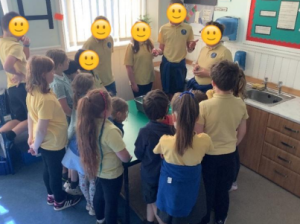
More than 100 teachers from across Scotland have undergone professional learning to increase their understanding about the STEM skills involved in the subsea industry. Global Underwater Hub (GUH) funded the initiative and provided its Subsea Channel series of video resources for teachers.
The training was delivered by Aberdeen Science Centre (ASC) and coordinated by the RAiSE (Raising Aspirations in Science Education) programme.
Lessons are now underway in classrooms, with young people expressing their excitement in understanding topics such as marine biology, diving, surveying the seabed, robotics, and ROVs.
Laura McCafferty, National Education Officer for RAiSE, said:
“This has been a really valuable national partnership which has empowered teachers with the skills, resources, and training to take a variety of experiments back to their schools.
“We would like to extend our thanks to GUH and ASC for their partnership and we look forward to seeing how this continues to impact pupils.”
Professional learning sessions were held in Aberdeenshire, Angus, Clackmannanshire, Dumfries & Galloway, Dundee, Falkirk, North Lanarkshire, Orkney, Renfrewshire, South Lanarkshire, and West Lothian. Each authority received 10 kits to take back to their schools to share their learning with colleagues and implement in their classrooms. They were also sent videos of the training so they could revisit key themes and cascade to colleagues, as well as lesson plans which linked the training to scientific skills and the DYW Career Education Standard.
One of the schools that benefitted from the training was Cairnie Primary School in Aberdeenshire where pupils undertook at diving bell experiment. Older pupils, who are training to be STEM Champs in the school, supported younger learners with the experiment.
As part of the experiment, different sizes and shapes of glasses were used to discover if size made a difference to how much oxygen was available. They were placed over a candle and timed to see how long it took for the candle to go out. This highlighted how early diving bells worked.
Pupils were impressed by the experiments and enjoyed working across different year groups.
Trish Banks, Operations Director at the Global Underwater Hub, said:
“The Subsea Channel aims to inspire youngsters across the country to consider the underwater sector as a future career path, one which is brimming with opportunities. Through the RAiSE programme, it has been really encouraging to see so many young people taking a keen interest in learning more about STEM subjects and considering a future career path in our sector as we continue our journey towards Net Zero.”
Kostas Minas of Aberdeen Science Centre:
“Delivering these sessions has been a wonderful opportunity for our team. This programme’s focus on skills has made learning exciting and fun, while links to the Curriculum for Excellence made it easier to incorporate in a classroom environment. To date, teacher engagement has been extremely high and it was really exciting to see the activities used with such enthusiasm in the classroom. It was really inspiring to hear that pupils also engaged well with these activities, as well as that teachers seek to reuse and expand on these activities in the future. This could not have happened without funding from the Global Underwater Hub, or coordination from RAiSE officers. We would really like to thank our partners and we look forward to any future opportunities like this.”
Teachers shared that their understanding of the topic doubled through the sessions, and that they felt more confident and motivated to teach STEM, as well as better understanding STEM careers.
Feedback from the professional learning sessions included:
“Amazing links with CfE! Lots of learning in each experience – can be adapted to suit different individuals, groups or whole class. Can be one off lesson or completely broken down.”
“I now have better ideas for carrying out experiments I have tried previously – lessons will be more engaging/challenging.”
“Great practical activities for use in class to allow children to develop reasoning and understanding through investigation. Great teacher notes to help us understand before we teach!”
At St Louise Primary School in South Lanarkshire, P3 and P4 pupils undertook a series of tasks focused on the seabed, floating, and robots. Feedback from the school included:
Sophie (P4): “I liked finding out about the sea animals. I enjoyed making the seabed – I didn’t know that the seabed wasn’t flat. I loved making boats too.”
Lily (P3): “I like measuring the seabed. It was fun when we were doing floating and sinking with fruit. I was surprised by them. I didn’t know there are tiny air bubbles in water.”
Grace (P4): “I liked investigating the seabed because you could feel different things. It was something new and I learned about the seabed and what it was like. I also liked the robots – they were cool.”
Class Teacher Sian Docherty said:
“Children were motivated and engaged by the depth and range of activities. There were opportunities for them to be creative, critical thinkers and problem solvers. The activities were appropriate for their age and stage and the resources provided to support were excellent.”

